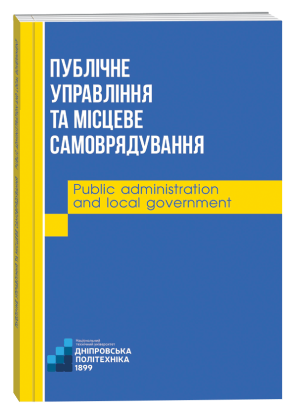THEORETICAL APPROACHES TO THE CONCEPTUALIZATION OF SUSTAINABLE DEVELOPMENT IN THE PUBLIC ADMINISTRATIVE DISCOURSE
DOI:
https://doi.org/10.32782/2414-4436/2023-4-9Keywords:
sustainable development, resource provision, limited growth, public administrationAbstract
Conceptual approaches to the interpretation of sustainable development are considered. The author argues that in order to form a new model of public management and administration, to ensure their effectiveness in the context of ensuring sustainable development of territories, an additional analysis of the work of scientists in the study of public management and administration is required. It is shown that the initial concept of sustainable development is based on the idea that the use of resources at the present time should not lead to a decrease in the standard of living of future generations. The dichotomization of interpretations leads to different definitions of sustainable development. The first definition of sustainable development, which dominates the official discourse, can be reduced to the notion of limited economic growth. This approach to development involves two distinct phases. First, a contractual relationship based on environmental criteria must be established. Only then can the standard utilitarian goal of maximizing economic returns be achieved. It is emphasized that further growth, even if planned with environmental considerations in mind, ignores the growing evidence that the economic demands we place on the environment now exceed what the ecosystem can withstand. It is emphasized that the identification of sustainable development with sustainable growth is contradictory, because such an idea contradicts the generally accepted recognition of the existence of "boundary limits" of useful resources. The second definition of sustainability is an approach to resource conservation that emphasizes the conservation of existing and future resources rather than continuous growth. This position builds on the criticisms discussed above and emphasizes the conservation of existing and future resources rather than continuous growth. Here, efforts are focused on minimizing our impact on the environment and the use of natural resources while meeting people's material needs. The protection of natural resources is a clear goal and is put on a par with economic considerations. According to the author, this approach is an acceptable methodological tool for the sustainable development of Ukraine in the context of post-war reconstruction.
References
World Commission on Environment and Development, 1987. 43.
Практичні аспекти публічного управління в контексті сталого розвитку : монографія / [В. М. Бабаєв, М. М. Новікова, С. І. Чернов та ін.]; Харків. нац. ун-т міськ. госп-ва ім. О. М. Бекетова. Харків : Друкарня Мадрид, 2019. 238 с.
Баштанник В., Рагімов Ф. Адміністративно-правові особливості функціонування механізму державного управління сталим розвитком регіонів Науковий вісник публічного та приватного права. 2017. Т. 2, № 6. С. 243–247.
Лукашов С., Белявцева В. Публічне управління в забезпеченні сталого розвитку територій: ефективність та результативність. Наукові перспективи. 2023. 7(37). DOI: https://doi.org/10.52058/2708-7530-2023-7(37)-194-205
Бурик З. М. Державне регулювання сталого розвитку України: теорія та практика : монографія. Львів. Вид-во Простір-М. 2017. 384 с.
Васильєва О., Васильєва Н., Приліпко С. Публічне управління сталим розвитком територій. Матеріали конференції. 2020. https://doi.org/10.36074/24.04.2020.v2.03
Гречко Т. К., Лісовський С. А., Романюк С. А., Руденко Л. Г. Публічне управління в забезпеченні сталого (збалансованого) розвитку : [навч. посіб.]. Херсон. Грінь Д.С. 2015. 264 с.
Державна економічна політика регіонального розвитку : монографія / за заг. ред. М. А.Латиніна. Харків : Вид-во ХарРІНАДУ «Магістр» 2017. 42–51.
Ігнат О., Маматова Т. Співробітництво територіальних громад задля забезпечення стійкості та сталого розвитку. Knowledge, Education, Law, Management. 2022. № 5 (49). С. 109–116. doi: https://doi.org/10.51647/kelm.2022.5.18
Пастух К. Публічне управління та адміністрування в забезпеченні сталого розвитку територій: теоретико-організаційний аспект. Науковий вісник: Державне управління, 2020. 1(11). 186–206. https://doi.org/10.33269/2618-0065-2022-1(11)-186-206
Рагімов Ф. Еволюція публічного управління в контексті сучасного процесу державотворення в Україні. Публічне управління та місцеве самоврядування. 2020. № 2. DOI: https://doi.org/10.33287/102021
Свірко, С. В., Власюк, Т. О., Харченко, О. А., & Тростенюк, Т. М. Інституціональні засади державного управління сталим розвитком урбанізованих територій. Економіка, управління та адміністрування, 2023. 2(104), 168–179. https://doi.org/10.26642/ema-2023-2(104)-168-17
Batie Sandra S. Sustainable Development: Challenges to the Profession of Agricultural Economics. American Journal of Agricultural Economics. 1989. December:1083-1101.
Korten David C. Sustainable Development. World Policy Journal. 1992. 9(1). 157–90.
Daly Herman E. and John B. Cobb Jr. For the Common Good. Boston, MA: Beacon Press. 1989. 120 р.
Lele Sharachchandra. Sustainable Development: A Critical Review. World Development. 1991. 19(6):607-21.
Worster Daniel. The Shaky Ground of Sustainability. Pp. 417-27 in George Sessions (ed.) Deep Ecology for the 21st Century. Boston, MA: Shambhala. 1995.
Naess Arne. Deep Ecology and Lifestyle. Pp. 259-64 in George Sessions (ed.) Deep Ecology for the 21st Century. Boston, MA: Shambhala. 1995.






